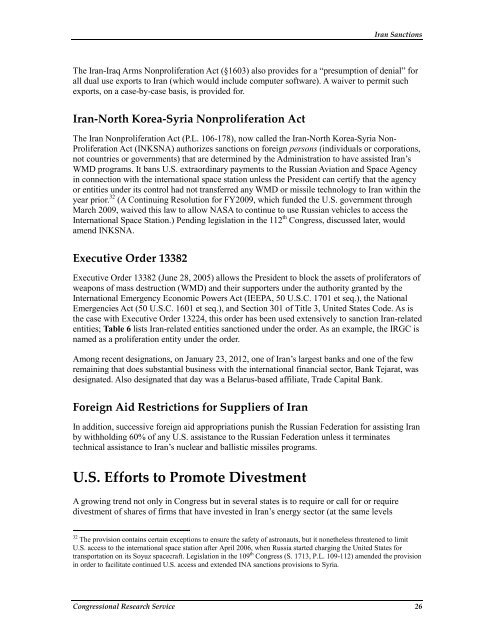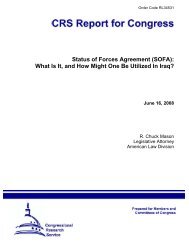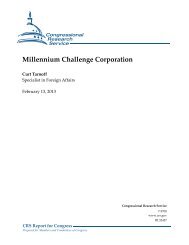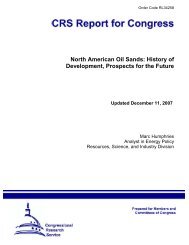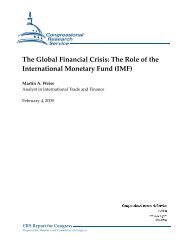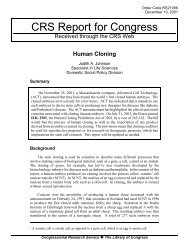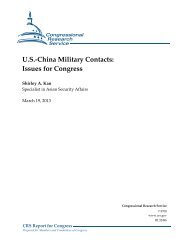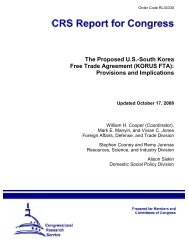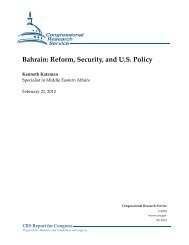Iran Sanctions - Foreign Press Centers
Iran Sanctions - Foreign Press Centers
Iran Sanctions - Foreign Press Centers
You also want an ePaper? Increase the reach of your titles
YUMPU automatically turns print PDFs into web optimized ePapers that Google loves.
<strong>Iran</strong> <strong>Sanctions</strong><br />
The <strong>Iran</strong>-Iraq Arms Nonproliferation Act (§1603) also provides for a “presumption of denial” for<br />
all dual use exports to <strong>Iran</strong> (which would include computer software). A waiver to permit such<br />
exports, on a case-by-case basis, is provided for.<br />
<strong>Iran</strong>-North Korea-Syria Nonproliferation Act<br />
The <strong>Iran</strong> Nonproliferation Act (P.L. 106-178), now called the <strong>Iran</strong>-North Korea-Syria Non-<br />
Proliferation Act (INKSNA) authorizes sanctions on foreign persons (individuals or corporations,<br />
not countries or governments) that are determined by the Administration to have assisted <strong>Iran</strong>’s<br />
WMD programs. It bans U.S. extraordinary payments to the Russian Aviation and Space Agency<br />
in connection with the international space station unless the President can certify that the agency<br />
or entities under its control had not transferred any WMD or missile technology to <strong>Iran</strong> within the<br />
year prior. 32 (A Continuing Resolution for FY2009, which funded the U.S. government through<br />
March 2009, waived this law to allow NASA to continue to use Russian vehicles to access the<br />
International Space Station.) Pending legislation in the 112 th Congress, discussed later, would<br />
amend INKSNA.<br />
Executive Order 13382<br />
Executive Order 13382 (June 28, 2005) allows the President to block the assets of proliferators of<br />
weapons of mass destruction (WMD) and their supporters under the authority granted by the<br />
International Emergency Economic Powers Act (IEEPA, 50 U.S.C. 1701 et seq.), the National<br />
Emergencies Act (50 U.S.C. 1601 et seq.), and Section 301 of Title 3, United States Code. As is<br />
the case with Executive Order 13224, this order has been used extensively to sanction <strong>Iran</strong>-related<br />
entities; Table 6 lists <strong>Iran</strong>-related entities sanctioned under the order. As an example, the IRGC is<br />
named as a proliferation entity under the order.<br />
Among recent designations, on January 23, 2012, one of <strong>Iran</strong>’s largest banks and one of the few<br />
remaining that does substantial business with the international financial sector, Bank Tejarat, was<br />
designated. Also designated that day was a Belarus-based affiliate, Trade Capital Bank.<br />
<strong>Foreign</strong> Aid Restrictions for Suppliers of <strong>Iran</strong><br />
In addition, successive foreign aid appropriations punish the Russian Federation for assisting <strong>Iran</strong><br />
by withholding 60% of any U.S. assistance to the Russian Federation unless it terminates<br />
technical assistance to <strong>Iran</strong>’s nuclear and ballistic missiles programs.<br />
U.S. Efforts to Promote Divestment<br />
A growing trend not only in Congress but in several states is to require or call for or require<br />
divestment of shares of firms that have invested in <strong>Iran</strong>’s energy sector (at the same levels<br />
32 The provision contains certain exceptions to ensure the safety of astronauts, but it nonetheless threatened to limit<br />
U.S. access to the international space station after April 2006, when Russia started charging the United States for<br />
transportation on its Soyuz spacecraft. Legislation in the 109 th Congress (S. 1713, P.L. 109-112) amended the provision<br />
in order to facilitate continued U.S. access and extended INA sanctions provisions to Syria.<br />
Congressional Research Service 26


